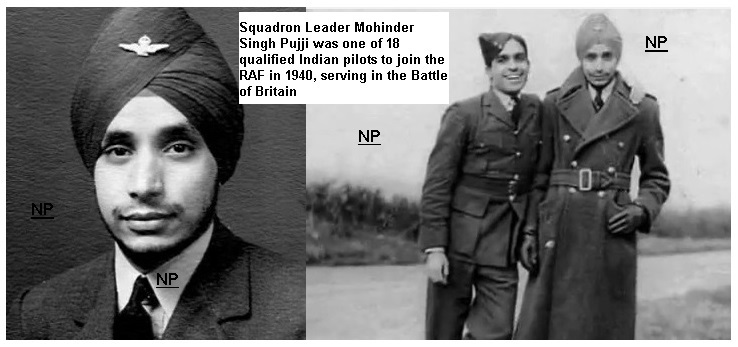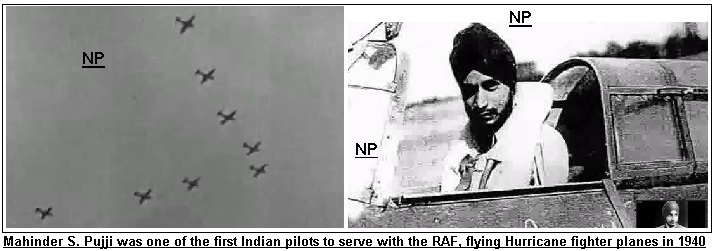 |
£70,000 statue of Battle of Britain NRI pilot Mahinder Singh Pujji unveiled
Born in Simla- School in Lahore- law degree from Bombay University- first Indian pilots fly Hurricane fighter planes in 1940 for Britain- Statue in UK
Gravesend, UK, Nov. 28, 2014
NRIpress-Club/ Gary Singh/Col. Ashok Mehta/Karen

A statue of Battle of Britain pilot Mahinder Singh Pujji was unveiled in Gravesend today as the town pays tribute to volunteer servicemen from overseas. He was one of 18 qualified Indian pilots to join the RAF in 1940, serving in the Battle of Britain and later Burma and the Middle East.
Pujji was treated as a hero in wartime Britain. He represented servicemen who volunteered to fight for Britain in military campaigns from 1914 to 2014.

"I wrote back to my father saying that I did not mind if I was killed because the British people were wonderful and so brave, and I was being so well treated. I could not queue for a movie without being told to move to the front,” said Mohinder Singh.
“As a Sikh, I insisted and got permission on retaining my dastar (Sikh headdress), with RAF insignia, even while flying, even carrying a spare, in case it was needed and the dastar interfered with use of my oxygen mask and resulted in damage to my lungs,” said Singh. “In 1960, I gave up wearing the dastar.”
 
Squadron Leader, Mahinder Singh Pujji died in Gravesend at the age of 92 after suffering a stroke in September 2010.
Mahinder Singh Pujji was one of the first Indian pilots to serve with the RAF, flying Hurricane fighter planes in 1940, and wrote his experience when he survived from his burning plane :
- · On one occasion I suddenly found that my dashboard was gone. I didn't notice because of the noise of the engine. A bullet had passed through my jacket and the whole of the dashboard was shattered. Then black smoke and oil started coming from the front of the engine at about 18,000 feet.
- · I started to glide over the English Channel. At 7,000 feet I was advised by radio to bale out of the plane over the Channel where I would be picked up by a boat in the area. But as I could not swim and did not like the idea of jumping out of the plane I told base that I would try to make a forced landing. I was encouraged when I saw the white cliffs of Dover, and everything was going fine until I opened up my landing gear and the plane burst into flames.
- · I managed to crash-land the plane and was dragged from the burning wreckage. I spent the next seven or eight days in hospital."
- · The day I shot down my first aeroplane, I went into my room and lay down – I didn't want to talk to anyone. What I had gone through – that could have been my death, you see."
- When I was in England during the war I was treated very well indeed. I had my own driver and petrol was paid for. When I went to the cinema I used to get in the queue with everyone else, but people would insist that I got to the front of the queue – I think it must have been my uniform. I would get to the front of the queue and try to pay for my ticket, but was let in free. Similar things happened at restaurants in the village; often the owners would not take payment for a meal. I felt very welcome indeed, I never felt different or an outsider and my experiences in this country made me keen to return some time after the war. I was made to feel very much at home by everyone I met."

"Everyone loved me and l fell in love with England. That was the mistake I made, I didn't realise it has changed now,” said Singh.
Mahinder’s son Satinder Singh, 62, said, “My father loved living in Gravesend and he loved this country. In a letter to my grandfather he said he wanted his ashes buried here. It was his home. We have relatives from across the world here today from Australia, America and India.”
"This is a great day for the borough following a lot of hard work from the community,” said council leader John Burden. “This is a small token of our appreciation to all those who volunteered from overseas."
BIO:
Squadron Leader Mohinder Singh Pujji, 1918 – 18 September 2010:
He was born in Simla, Punjab, India. His father, Sohan Singh Pujji was a senior government official. He. went to school in Lahore and received law degree from Bombay University.
- · In 1936, he got training and learned to fly at the Delhi Flying School, where he fell in love with flying
- · When war broke out he saw a newspaper advertisement asking for pilots to join the RAF. Pujji thought this would be a great adventure. He volunteered straight away and came to England in August, 1940.
- · He became one of 18 qualified Indian pilots who volunteered for the Royal Air Force. He was seconded to RAF depot Uxbridge on 8 October 1940, until he completed his military flying training.
- · He joined 43 Squadron, the formidable 'Fighting Cocks' fighter squadron, got permission to fly with his turban, designing a special cap that would fit over his turban so that he could still use his headphones and oxygen mask
- · He flew Hurricanes, became fighter pilots and forced down twice. One time , his aircraft was disabled over the English Channel, rescued from the burning wreckage, hospitalized and return on duty after 7 days.
- · In September 1941, he was stationed in North Africa and later transferred to the Indian Air Force, flying in operations in the North West Frontier Province between 1942-3.
- · In December 1943 he was posted to No. 6 Squadron on the Arakan Coast in the Burma
- · In 1944, he transferred to No. 4 Squadron. He was a squadron leader with the Indian Air Force in Burma 1944-5, making him one of the few Indian pilots to have served in all three theatres of war.
For his outstanding leadership and courage, he was awarded the Distinguished Flying Cross.
- · He settled in the UK in the 1970s.
- · Hr returned to India, held gliding records and became a champion air race pilot
- · In 1974, he became an air traffic controller in UK
· After retirement, he became an active member of the local community and made an Honorary Freeman of the Borough of Newham in Oct. 2000
- · In 2005, Singh protested against the British National Party's use of an image of a Spitfire in their campaign literature
In Aug. 2010, Mohinder Singh’s autobiography was added in Movie, “King And Another Country”. Mohinder Singh was highly respected but he believed that war films presented a "white-only view of the RAF.
The Royal Air Force Museum Cosford opened a permanent exhibition in January 2009 and Mohinder Singh was the guest of honour at the opening.

|





